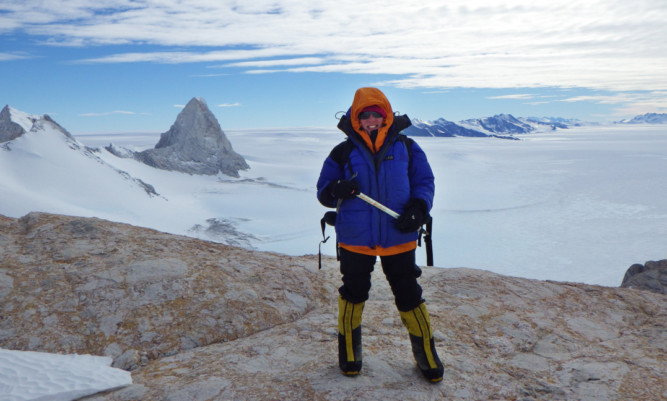An Arbroath Antarctic adventurer is pushing at the boundaries of global climate science.
Kate Winter is part of the team that recently revealed ice in Antarctica is holding back three metres of water from the world’s oceans but is shrinking due to warming seas.
In the first study of its kind, a multi-disciplinary team from the universities of Edinburgh and Northumbria assessed changes in the West Antarctic ice sheet over hundreds of thousands of years.
The 25-year-old, who studied at Arbroath High School and has an affinity for the world’s coldest places, compiled radar data for the paper entitled, Evidence for the Stability of the West Antarctic Ice Sheet Divide for 1.4 Million Years.
She said the team’s findings showed there has been ice at the bottom of the world for at least that long, and there is evidence for its depth fluctuating during that time.
“We don’t talk about the human impact on the climate,” said Kate, who was married in the town last year and appreciates the nominative determinism of taking the name Winter.
“What we’re saying is the Antarctic ice has been there for 1.4 million years, so it’s actually quite stable, but we know that it has been smaller in the past.
“The initial fear was for five metres of sea level rise if the whole ice would disappear.
“What we’re now seeing is that it’s very unlikely that the whole sheet’s going to go.”
But Kate said even three metres of water would have drastic implications around the world.
The team studied peaks protruding through ice in the Ellsworth Mountains, on the Atlantic flank of Antarctica.
They assessed changes on slopes at various heights on the mountainside, which indicate levels previously reached by the ice sheet.
The results, published in the journal Nature Communications, indicate a substantial amount of ice would have been lost from the West Antarctic ice sheet by ocean melting during previous warm periods, but it would not have melted entirely.
This suggests that ice would have been lost from areas below sea level, but not on upland areas.
The Aberdeen University graduate is pursuing a PhD at Northumbria, and says her appetite for adventure was first inspired by a “great” geography teacher in secondary school, Paul Ewing.
“He planned a field trip to Iceland for a week,” she said. “I stood on my first glacier and just loved it.”
“Later I went to Greenland with the British Schools Expedition and loved being in such a remote place.
“I like the cold, and how money and time don’t matter. The things you worry about every day don’t matter out there.”
